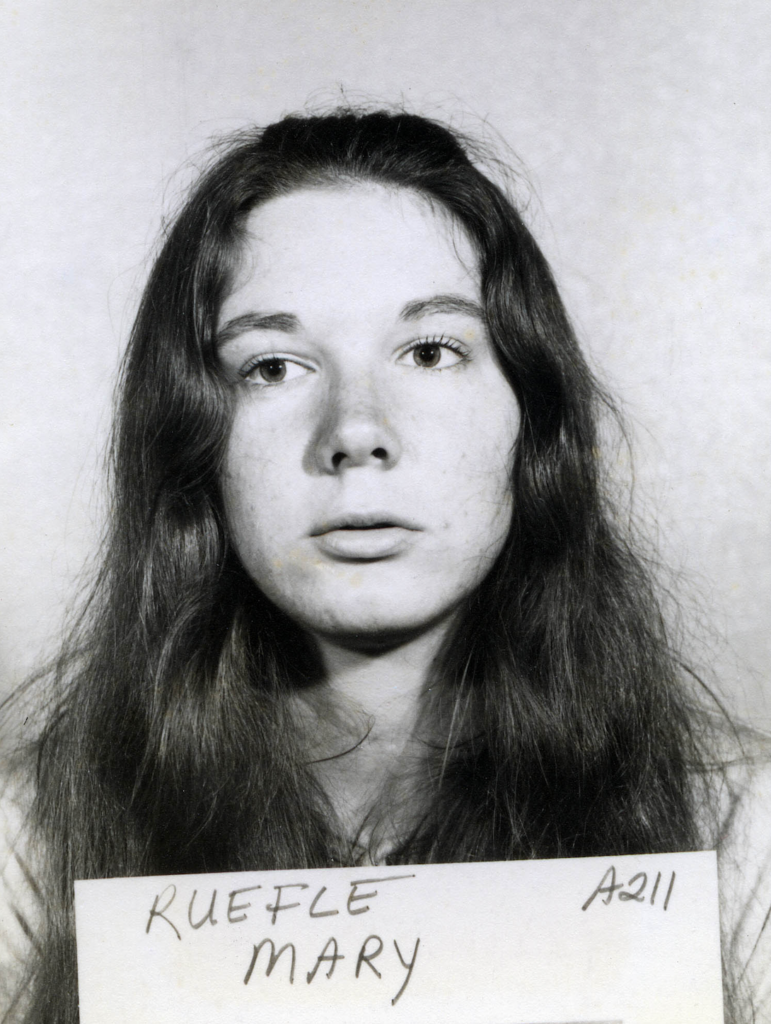
When the name LIT 4358: Chance Encounters first appeared on the Bennington Curriculum Spring 2022, it’s safe to say that most literature students felt either really intrigued or confused by the name of the course and its ominous description. However, there was one factor that made many of us submit an application to have a seat in the class without second thoughts: it would be taught by poet Mary Ruefle.
When it comes to American contemporary literature, Mary Ruefle is widely recognized for her witty and stunning poetry, as well as for her remarkable fiction and essays. Many of us literature students at Bennington have read her work either in classes or for our own pleasure, knowing she is a brilliant writer who attended our college back in the 70s.
My first exposure to her work was last fall when I saw an exhibition of her beautiful erasures at the Robert Frost House Museum during a faculty reading that was held there. As soon as I set my eyes upon them, I fell in love with them. I had never thought much about erasures— it is not a form of writing that we are asked to try in poetry classes, and the times I had encountered them before I’ve always felt indifferent about them. However, Ruefle’s erasures were so elaborate, including drawings, cut-up pictures of flowers and moons, and of course, an incredible selection of borrowed language. I found these erasures to be very profound (although she might not agree with that description) and consequently decided to buy her newest book of poems Dunce (2019) and found myself becoming a Mary Ruefle fan.
As soon as the registration period opened, I submitted an application to Chance Encounters before any other class, sending a letter of interest and a small portfolio of five poems. It was quite a disappointment when I heard back from my advisor during the winter that sadly, I hadn’t gotten into the class but was added to the waitlist. In that moment, I had lost all hope because I thought “who would ever drop a class with Mary Ruefle?” When I came back to school for the spring semester, I talked to some of my friends and classmates who had gotten into the class and told me that since the first class was supposed to be remote for covid safety purposes, instead of having a zoom meeting each of them had received a 10 page letter from her but that she asked them to not reveal its content to anyone or otherwise they would be “expelled” from the class. As anyone with an inch of curiosity in their brains, I was dying to know what the letter said, but I knew there was no point in stressing about it anymore, so I made peace with it and started taking a different class on fridays.
However, very much in the style of the class, one day before the first day of in-person classes I received an email from my advisor saying that someone had dropped the class and Mary Ruefle wanted to offer me a seat, but that I had to make sure to get the ten-page letter from the student who dropped the course as well as read the first 160 pages of Swann’s Way by Marcel Proust in the next couple of days. I was ecstatic; I instantly accepted the offer, dropped my other class, and ran to the library to get my hands on Proust’s thick first volume. So suddenly and by chance, I was in Mary Ruefle’s class.
I remember walking into Dickinson 209 that morning and seeing Ruefle sitting at the center of the classroom playing a Bob Dylan CD all the way up. From that moment on, I knew the class would be special. I was not disappointed. Ruefle would start every class reading a passage from different books, and then we would move on to talk about the assigned readings, our creative assignments, and meditations on our childhoods, chance encounters we’ve experienced, and even our dreams and fears for the future.
Ruefle’s reading list included Swann’s Way, Agua Viva by Clarice Lispector, Three Poems by John Ashbery, and The I Ching, and we explored the ways in which these authors wander in their writing and tried to replicate the process in our own creative way with assignments like writing a one page long sentence, writing a poem using only the words one of our peers used in their long sentence, and writing a poem using a chance method.
Last week, I sat with Ruefle at the Roasted Bean in North Bennington to have a conversation about her return as a professor to campus last spring, as well as her work. We met at 12:30, ate lunch and caught up for a little while; we talked about our summers and the books we’ve been reading, and then I asked her about her experience coming back as a professor after being a student and having previously taught here. She answered truthfully: “It’s a difficult question… after I was a student I taught here for ten years [1979 to 1989], and I was a young grad in 1974. Then, all memories were fresh and intense. coming back to teach then must have felt differently than it does now or last semester because half a century has passed and those memories are not central to my life in any way anymore, so it doesn’t mean anything. But I’m sure it was a big deal in 1979, although it feels meaningless to make the connection now. So much has intervened so much has changed. But it’s interesting, because when I taught here before, I was close in age with the students, less comfortable and more nervous. After a lifetime, I am comfortable and I’m a better teacher and now I know so much more than the students, and have so much more life experience, so it’s pie.”
And pie it was! Every Friday, all the students in the class were so eager to hear her talk about the reading for the week but also about all the life experiences that she would share with us, her taste in art and music, and her honest life advice when we asked for it. And we also had fun with her; she always kept us excited about what was going to happen in the next class, giving us little assignments like bringing a small object to class without telling us what we were going to use them for only to find out that she wanted them arranged on the table just so she could knock them off of it, or give a presentation about a place we’ve encountered chance in literature or elsewhere for which one student made Ruefle play a video game for twenty minutes.
Every single one of us admired her, and even people who weren’t in the class felt impacted by it. For instance, last spring, after learning how to read the I Ching and listening to Ruefle saying carefully “You shouldn’t use the I Ching for divination” I did what anyone who has just discovered they have a superpower would do: get all my friends together and show it to them. I did I Ching readings for all of my friends and we all had a blast listening to the ominous or exciting fortunes the three coins and the hexagrams provided. However, a reading for a friend promised a life changing turn that would bring a lot of pain but also a lot of growth and happiness once the difficulties passed. Over the summer, this became true, but we didn’t realize how accurate the reading had been until months later. “I didn’t even take the class and it still changed my life” said my friend when we discussed this.
During our meeting, I shared this anecdote with Ruefle as well as told her how impactful she was to all of her students, to which she replied: “I can’t quite believe that, but you’re very generous and kind. I loved you guys, I looked forward to every Friday.” She also mentioned how even though she told us not to use the I Ching for divination purposes, she knew we all would do it, because even she used it with that same intention for a long time. “Not really, now it’s like meeting an old friend in a café once in a while,” she answered when I asked if she still uses it frequently.
I was of course very curious how she decided to teach an entire course about chance and how she decided to have us start with reading Proust and end with The Book of Changes, so I asked her how she brought Chance Encounters into life: “Well, I knew that I wanted to reread Proust during the winter, and suddenly I had 48 hours to come up with a course, so I decided to incorporate all the books I wanted to reread that winter. Proust and Lispector were on that list so I just wrote them down, and I wondered: what could possibly connect all these books? and so I thought: chance! I’m too old to care about how to put a course together, I threw it together like the I Ching.” Teaching a course on chance by chance is a very interesting concept, but it also makes it harder to predict the outcome of certain things, such as how students will react to the texts. so I decided to ask if she perhaps would’ve done anything differently now that she knew what chance would bring to the classroom. “I would choose a different list. I would keep Proust, change it to a different Lispector, different Ashbery, that was a mistake. I would have chosen short stories by Lispector and lineated poems by Ashbery. I had outgrown Agua Viva. I used to love it, but now I was… I don’t know.”
She also told me about a chance encounter she experienced over the summer that made her think of her reading list for the course: “The novelist Elif Batuman published a new novel which is a sequel to her first novel, which I adored. So I bought the second novel, which is about a student and in the book, the student is flipping through a course curriculum in Harvard and there’s a course offered on chance. And in that class they read the I Ching. I don’t know if it was a real course at Harvard or if she made it up, but they read I Ching in that course and other books that were better selections than mine.”
I then asked her whether she has been working on any new projects we should be excited about. Ruefle told me, “I’m not a person who has projects, but my next book is in production, which means is at the publishers and it will publish in the fall of 2023, it is a book of prose pieces, and then I continue to write poems because they won’t go away even though I wish they would, and I have been working for a long time on a book of fragments which I will probably die before I finish, and then of course there are my erasures and I continue to make those books, page by page. Are those projects?” At the mention of her erasures, I remembered that when I turned in a poem in erasure for an assignment in class she mentioned that she doesn’t much mind erasures— which confused me quite a bit considering I had first fallen in love with her work through her erasures and I’ve seen them exhibited and published for instance, in the tenth issue of the Bennington Review. So I decided to take the chance and ask her about that comment she made in class.
“Once I found myself saying out loud with no premeditation ‘I am not actually interested in erasure despite the fact it is my life passion’ which is very funny but as soon as I said it I realized it was true,” said Ruefle, “I think I meant that though I love the activity of making these books, I am not interested in erasure as a form to be discussed, or talked about. Why not? Once I was invited to a university in California to give an erasure workshop where members of the community, most of them adults, sat at a table surrounded by art supplies and old books and magazines from which they could cut images and they were having fun, and I was walking around the classroom, leaning over each one, and trying to be encouraging, but my innermost thought was ‘this is basically kindergarten I will never do it again.’” I thought this comment was indeed very funny and also true, however, I myself have found profound emotions in reading and writing erasures, especially in hers, so I asked her whether she thinks erasure can have any profundity despite its method being a little like arts and crafts. She answered: “The only profundity that erasure could possibly have is when you apply it to your own life. For instance what I said earlier about my college memories, being on the whole erased. The years, as they pass, erase many things. But note, I am talking about life, not books.”
At the end of our meeting, before we went into the new magic bookstore in North Bennington and drove back to campus, I asked her what the title of her favorite poem she has written is, but she couldn’t decide. So I told her one of my favorite poems by her is Last on Earth to which she responded, “I don’t know what poem you’re talking about.” And so I showed her. And she was amazed; she said: “This is so old! I forgot I had written this!” We went through her published poems that you can find online and she would point at them one by one and decide whether they were good or not. She seemed really excited about this: “New work becomes old work, and old work becomes new when you forget about it and encounter it years later.” which fondly reminded me of her brilliant poem On Twilight:
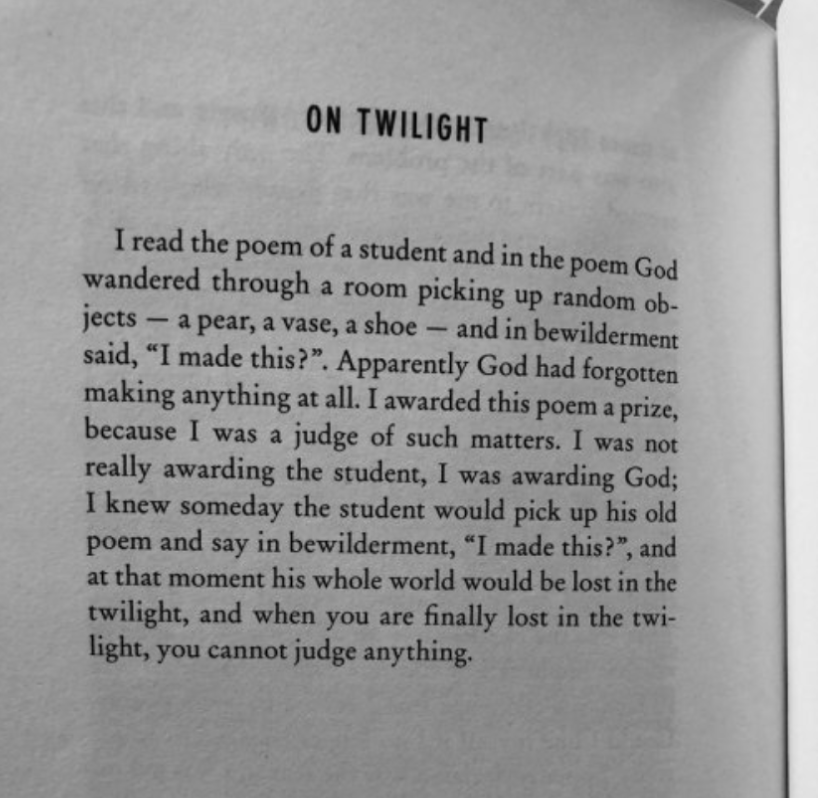
Chance Encounters was many things: formative, dense in its readings, but also fun, unexpected, and exceedingly magical. Perhaps time will come and erase many of my memories of my college experience just like it did with Mary Ruefle’s, but at least for now, the image of her reading Borges’s poetry to us at Lake Paran is engraved in my mind, and I plan on cherishing it for as long as I can.
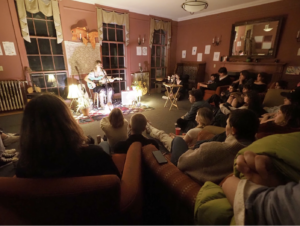

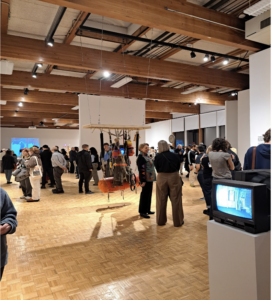
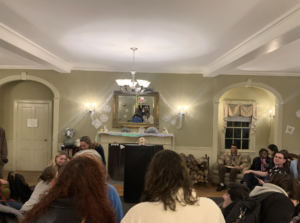

Be First to Comment